Economy. Oil & Gas and Green hydrogen.
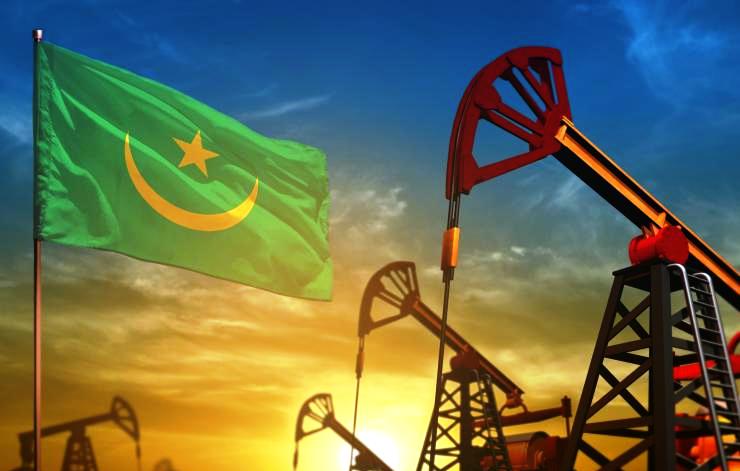
The government is focusing on green hydrogen to diversify the rapidly growing economy, aiming for growth in the renewable energy sector. The country is among those most suffering from the climate crisis with increasingly frequent and destructive floods and longer
periods of drought.
On the one hand, the prospect of becoming Africa’s third largest gas exporter in a few years, after Nigeria and Algeria; on the other, extreme vulnerability to the effects of climate change. This is the contradictory situation Mauritania is facing in the short and medium term.
It is one of the least densely populated and poorest countries on the African continent: less than 5 million inhabitants live on a territory of 1,030,700 km², of which 2.3 – according to Unicef – live in conditions of multidimensional poverty. The West African state, however, has years of economic growth ahead of it, the International Monetary Fund predicts the +5.1% forecast for 2024 will reach +14.3% in 2025.
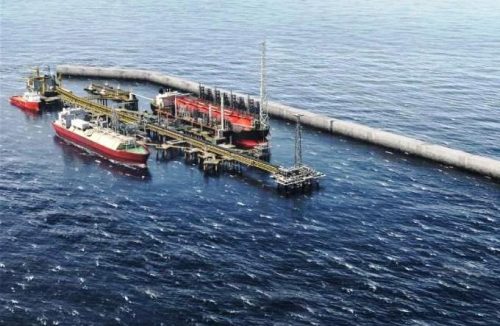
The Greater Tortue Ahmeyim is an offshore liquefied natural gas (LNG) project. Photo: Courtesy by BP p.l.c.
The reason for this giant leap forward can be found in the coming into operation of the Grand Tortue Ahmeyim offshore gas extraction project. The field is located 120 Km off the coast of the country, along the maritime borders shared with Senegal, at a depth of 2,850 metres. Operated by BP and Kosmos Energy, Grand Tortue Ahmeyim will reach full capacity in 2025 and by 2030 could produce 10 million tonnes of liquefied natural gas per year.
Europe is eager to find alternatives to Russian gas and is therefore following the development of the project with interest. NJ Ayuk, executive director of the African Energy Chamber (an energy group based in South Africa), explains that around 15 trillion cubic feet of gas could potentially be extracted from the site. “Taking advantage of its strategic location and the strong European demand, the field is perfectly in line with the European Union’s goal of reducing Russian gas imports by two-thirds by the end of 2024,” he comments.
The 100,000 barrels per day Sangomar oil field is expected to come online in 2025. The Sandiara plant is being equipped to obtain electricity from gas and expectations are also increasing regarding the reserves of the BirAllah field, estimated at 80 trillion cubic feet. Additionally, Mauritania’s national oil company is trying to rehabilitate the Banda gas field, which is expected to contain another trillion cubic feet.
Among the most active investors are France and Qatar. “TotalEnergies is conducting exploratory activities,” NJ Ayuk continues, “QatarEnergy in April 2023 had instead finalized the acquisition from Shell of a 40% stake in the C-10 offshore block”, where several sources of oil were found.
Growing Economy
The Nouakchott government expects to collect an Ouguiya equivalent of 20 million dollars (2% of the national GDP) in 2024 and 2.6 billion dollars in 2025, from the exports of gas extracted from the Grand Tortue Ahmeyim. This money alone, however, will not be enough to implement the structural transformation of the economy that the country needs, as reported in the latest Country Diagnostic Note drawn up by the African Development Bank. If it is true that the government, led since 2019 by President Mohamed Ould Ghazouani, has so far kept the threat of Jihadist infiltration under control, guaranteeing the country political stability in a region with strong coup traction such as the Sahel, Mauritania must, however, cope with several other age-old problems.
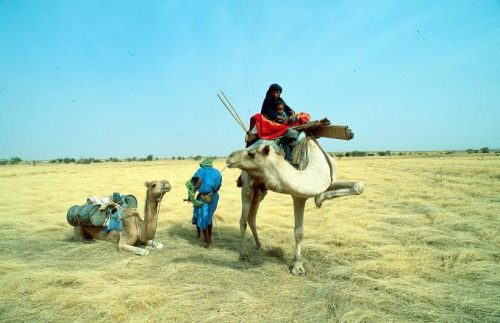
The desert allows agriculture on just 0.5% of arable land over the entire national territory. File smw
The desert allows agriculture on just 0.5% of arable land over the entire national territory. In vast rural areas, access to electricity, drinking water and sanitation services is very low. Energy dependence on fossil fuels and on investments made in the sector by foreign companies, and economic dependence on China, which last August cancelled 18.5 million euros of debt owed by Mauritania, risk keeping the country at a standstill despite the enormous reserves of raw materials at its disposal.
Climate Crisis
Added to this are the devastating effects of the climate crisis, with increasingly frequent and destructive floods and longer periods of drought. Between 2000 and 2021, across sub-Saharan Africa, Mauritania was the third country to have suffered the greatest impacts on this front after Somalia and Swaziland.
The World Bank Report “Navigating the Storm – How urbanisation and climate change exacerbate the Risk of flooding in Mauritania”, finds that the damage caused by flooding to infrastructure in the last rainy season cost the country’s economy 3% of its GDP.
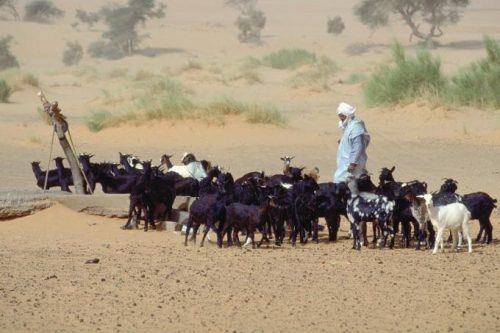
The country has been suffering from long periods of drought. File swm
The study underlines that without the adoption of a unified institutional framework that provides for coordinated responses to these emergencies, and without the adoption of a new regulatory system that promotes the development of cities and population centres that are more resilient to climate change, starting from more prudent management of water resources, the ongoing urbanization processes, linked to the gradual growth of the population and the abandonment of rural areas, will come face to face with the fury of the next
natural disasters.
Green Hydrogen
Alongside these policies of adaptation to the climate crisis, interesting growth opportunities are also opening up for the country in the renewable energy sector. Mauritania has around 700 thousand km² of land in which to install solar panels and wind turbines. Overall, there is talk of a potential of 350 gigawatts of energy to be obtained from these sources. The International Energy Agency’s report, “Renewable Energy Opportunities for Mauritania”, indicates that increasing energy generation capacity from renewable sources could help the country reduce the impact of extractive activities which currently cover almost a quarter of its national GDP.
The use of solar and wind power systems to start the energy generators that power mining activities, replacing diesel and heavy fuel oil, would guarantee greater energy security and reduce carbon dioxide emissions. For now, however, the interests of foreign companies and governments are focused on green hydrogen.
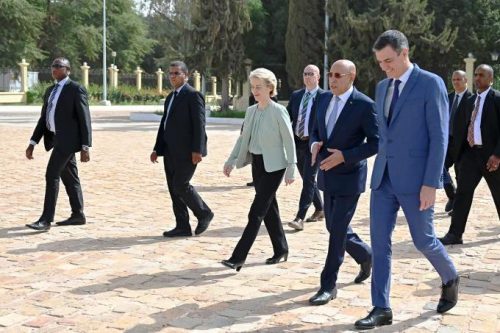
From right, Spanish Prime Minister Pedro Sánchez, Mauritanian President Mohamed Ould El-Ghazaouani, and President of European Commission Ursula von der Leyen. Photo: European Commission.
In March 2023 the Mauritanian government signed a 34-billion-dollar agreement with Infinity Power Holding, a joint venture between Egyptian Infinity, Emirati Masdar and German Conjuncta GmbH, for the realization of the Aman project which involves the construction of a plant producing 8 million tonnes of green hydrogen per year. “The 15 GW project marks a turning point in the field of African renewables”, NJ Ayuk continues, “TotalEnergies and Chariot are also developing another 10 GW project called Nour”. The European Union also wants to invest in green hydrogen “cultivated” in Mauritania. In a meeting held in Nouakchott at the beginning of February 2024 with President Ghazouani, the President of the EU Commission, Ursula von der Leyen, confirmed that member countries will look at the projects in the pipeline in Mauritania to achieve the objective of producing ten million tonnes of green hydrogen by 2030 at a national level. The first part of this agreement will be the financing of the new road infrastructure between Nouakchott and Nouadhibou, where one of the hubs under development is located. (Illustration:123rf)
Rocco Bellantone



